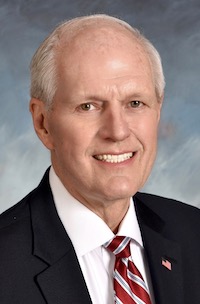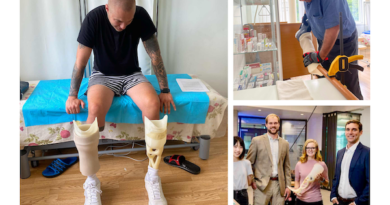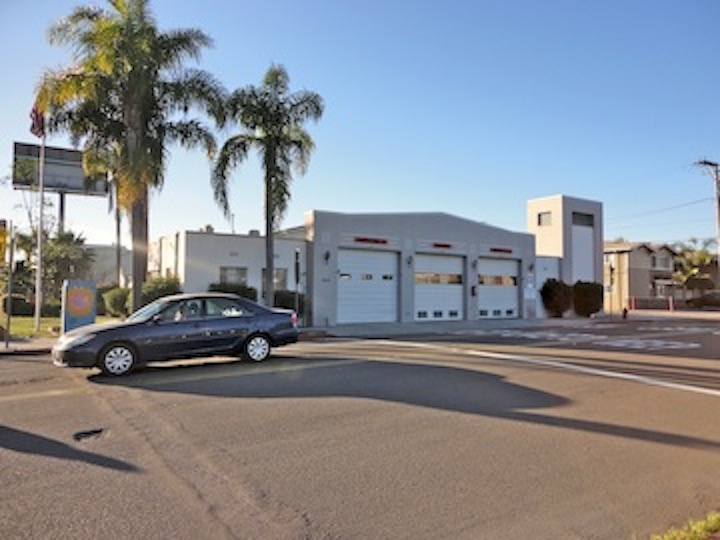Daily Business Report-July 5, 2018
At The Stand Farmers Market at San Diego Mesa College, students receive fresh produce at no cost — one of the ways San Diego Community College District is addressing problems cited in the report. (Photo courtesy of Mesa College)
College students battle hunger and homelessness
Food and housing figures reported
in San Diego Community College District
An increasing number of San Diego’s community college students face food insecurity and many also face homelessness, according to a recent study conducted by the University of Wisconsin’s HOPE Lab of more than 700 students in the San Diego Community College District (SDCCD).
In 2017, the HOPE Lab surveyed 43,000 students from 66 institutions across the nation, almost half of which were community colleges. The national study found that food and housing insecurities were worse for community college students compared to university students. The results for the district show an increase in the percentage of students reporting challenges with having adequate food and shelter. This was the third study for the district.
The study found that, 56 percent of students surveyed at San Diego City College said they faced challenges being able to afford nutritionally adequate food, up from 44 percent in 2015. Forty-four percent of students at Mesa College reported difficulty meeting basic needs, up from 39 percent. At Miramar College, 36 percent of students reported they had faced challenges affording a meal, down from 40 percent in 2015. Lastly, 42 percent of students at Continuing Education faced food insecurity, up from 28 percent. The survey’s national average for community college students was 42 percent.
In terms of homelessness, 15 percent of students surveyed at City College, 12 percent of students at Mesa College, and 10 percent of students at both Miramar College and Continuing Education reported that they experienced some form of homelessness in the past year. This compares with a national average of 12 percent.
Students were classified as having low food security if they answered affirmatively to several statements, including whether – within the past 30 days – they couldn’t eat for a whole day because they did not have money for food, whether they couldn’t afford to eat balanced meals, and whether they had to cut the size of a meal or skip eating because they didn’t have enough money to feed themselves. Black and Hispanic students registered the highest levels of food insecurity in the district, with the exception of Miramar College, where Hispanic and Asian students registered the highest levels of food insecurity.
Students were classified as housing insecure if they answered affirmatively to at least one of several statements, including whether – within the past 30 days – they had moved in with other people due to financial problems, whether they had moved two or three times, and whether they had not paid the full amount of rent or mortgage. More than 44 percent of City College students said they had been housing insecure within the past month, more than 43 percent of Continuing Education students said they had been housing insecure within the past month, nearly 37 percent of Mesa College said they had been housing insecure, and more than 32 percent of Miramar College students were housing insecure.
The scope of the problem is staggering when you consider that the district annually serves approximately 100,000 students.
“Students at San Diego City, Mesa, and Miramar colleges and San Diego Continuing Education are representative of the community at large, which is facing serious challenges with food and housing because of the high cost of living in the region,” said Vice Chancellor of Student Services Lynn Neault. “Like so many others in the area, the San Diego Community College District is doing what it can to address these challenges while at the same time looking at innovative solutions.”
In response to the current situation, the district’s colleges and Continuing Education are hosting food and clothing pantries, sponsoring farmers markets where students receive fresh produce at no cost, and working with community partners to address students’ basic needs.
__________________
Ireland, Ghana, Mexico entrepreneurs shine
in Global Social Innovation Challenge
University of San Diego’s Center for Peace and Commerce hosted its first Global Social Innovation Challenge, an entrepreneurial showcase of ideas from college students worldwide. Teams representing Ghana, Ireland, and Mexico emerged as the biggest winners, earning the largest shares of CPC’s $50,000 seed funding prize pool, and gained increased awareness for their projects, all of which were inspired by the United Nations’ 17 Sustainable Development Goals (SDG)
__________________
Brain Corp announces strategic investment
in mobile robotics company Savioke
Brain Corp, a company specializing in the development of self-driving technology for robots, announced its investment in Savioke, developer of Relay, the first indoor service robot that works safely, securely and reliably in public environments including hotels and hospitals. As part of its participation in the Series B funding round, Silicon Valley-based Savioke will also license BrainOS, a software platform streamlining the development, deployment and management of mobile robots.
Brain Corp partners with original equipment manufacturers to integrate BrainOS into their manually driven machines, allowing for smart, self-driving capabilities.
__________________

Transcend Air introduces VTOL commuter
Boston-based Transcend Air Corporation announced that it has begun development on a six-seat vertical takeoff and landing (VTOL) concept designed to carry business travelers between major cities. The Transcend Air Vy 400 will be a piloted, turbine-powered model intended for four to five passengers. The company has also said it has plans to launch a commuter airline service in early 2024.
According to the company website, a Vy trip from New York to Boston would take 36 minutes and cost $283 per seat. Transcend Air plans to open the order book for the aircraft in late 2020 at a price of $3.5 million.
__________________
North County Realtors to review
changes to CAR forms
The North San Diego County Association of Realtors (NSDCAR) will present “Contracts Express,” a class for Realtors on recent changes to real estate transaction forms from the California Association of Realtors (CAR), from 1 to 2:30 p.m., Thursday, July 12, at NSDCAR’s Vista Service Center, 906 Syacmore Ave., Vista. Cost to attend is $10 for members, $20 for nonmembers. For more information, visit www.nsdcar.com/education, or call (760) 734-397
Instructor will be Carlsbad broker Dana Whittaker, who also is serving as an NSDCAR board member.
__________________
Personnel Announcements
Ted Owen to retire as Carlsbad Chamber CEO

Ted Owen, long-time president and CEO of the Carlsbad Chamber of Commerce, has announced that he will retire effective January 2019. Owen first came to the Chamber in 2004, after retiring as president and publisher of the San Diego Business Journal (a position he held twice). Previous to that he was an executive for the San Diego Regional Chamber of Commerce.
Owen also had a successful 22-year career in the military, where he attained the rank of captain and served as public information officer for the Marines at Camp Pendleton and the Marine Corps Recruit Depot, San Diego.
“I’ve been deeply honored to have dedicated the past 14 years to the Carlsbad Chamber of Commerce,” said Owen. “When I came to the Chamber, I had spent 23 years in the business world. I learned a lot about business then, but the last 14 years have taught me many new things about the importance of providing our businesses with the resources they need to succeed, and to cheer them on as they move forward.”
__________________
Zane Bryant joins Higgs Fletcher & Mack as an associate

Higgs Fletcher & Mack announced the addition of Zane Bryant as an associate in its Immigration & Nationality Law practice group. Bryant’s experience includes working with Fortune 500 companies, small businesses and medium-sized businesses who seek employment-based solutions to their inquiries on immigration.
His extensive expertise includes representation in cases filed with the U.S. Citizenship and Immigration Services, Department of State and Department of Labor, including employment based nonimmigrant and immigrant petitions, PERM labor certifications, applications for adjustment of status, consular processing and naturalization applications.
Before joining Higgs Fletcher & Mack, Bryant committed himself to pro bono services throughout his law school studies and career, including his representation of asylum seekers, applicants for temporary protected status and DACA applicants. With his passion and broad experience, Bryant is able to successfully provide immigration solutions to businesses throughout a wide range of industries.
Bryant received his Bachelor of Arts in Economics and Political Science from San Diego State University. In his final year, Bryant worked with a political science professor with ongoing research on media representation of Mexican migrants, Tijuana and border enforcement. In 2015, Bryant graduated from Hastings College of the Law at University of California, San Francisco. During law school, Bryant interned at various immigration organizations where he gained experience representing individuals in their applications under the Violence Against Women Act, assisting in case strategy and research in removal defense cases. Bryant was also a member of the Hastings Center for Gender and Refugee Studies’ Human Rights clinical program and was recognized for his achievements and commitment to pro bono services.



